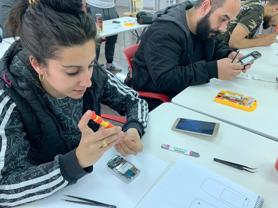11/04/2019
FSG

Fundación Telefónica and Fundación Secretariado Gitano have signed an agreement to launch six courses of Technical Assistant on Microcomputing and Communication Networks with the aim of training people at risk of social exclusion in digital skills favoring their personal and professional development for the insertion in the labour market.
On behalf of the two organizations, the General Director of Fundación Telefónica, Carmen Morenés, and the General Director of the Fundación Secretariado Gitano, Isidro Rodríguez, have signed the agreement at the Telefónica headquarters in Madrid.
In Spain, 26.6% of the population is at risk of poverty and social exclusion, with an AROPE rate 4.4 points higher than the European average, and among people in situation of unemployment, the risk of poverty and social exclusion rises to 56%. Both institutions found very important to cover the need of training in technological skills and cross-cutting skills profiles, which are more and more demanded.
The equality gap suffered by the Roma in education and employment is further aggravated in the frequent situations when the Roma population does not have access to the public services in equal conditions than the rest of the population. So, to put this group and others at risk of social exclusion facing the labor market and the education system under the same conditions and opportunities as the rest of the population, both foundations agree to conduct the courses to those who are in a situation of social vulnerability, whether or not they are Roma.
Microinformatics at the service of development and social equality
The microcomputing sector has been offering jobs for years due to the increase of computer equipment in practically all companies, but also new related jobs appear, such as the sale of electronic and computer devices, assistance in repair shops, helpdesk or service remote users, including equipment maintenance in schools that have incorporated digital technology into the classroom.
The first courses have already started in Alicante, Albacete and Córdoba; the one in Linares, in Jaén, and so will do it on April 22 and those in Granada and Valladolid will be held from mid-September. Participants have to pass a selection process that requires completion of ESO (obligatory secondary education) or basic vocational education, as well as a relatively high level of competence for employment. Each course, consist on 570 hours, combining theoretical and practical training, both in technical content and cross-disciplinary skills, with individualized psychosocial support, coordination with agents of the participant's environment, individualized tutoring in the process of training practices in collaborating companies and coordination with companies to support the adaptation of the students during the training and their labor insertion process.
With this training students will be trained to give support to companies or users in the proper functioning of PCs, printers, mobiles, tablets and some other computer equipment of usual use. In addition, participants will learn the basics of telecommunication networks: how a Wi-Fi works, what a LAN is, or how to access services in the cloud. In addition, after the training, students will perform non-work-related practices, completed with a training in the labor market to help the students to be competent in the searching for jobs. In addition, a module dedicated to the Prevention of Occupational Risks and sessions dedicated to transversal contents such as the Defense of Rights, Interculturality and Equality will be taught.
This collaboration agreement is part of the work that the Fundación Secretariado Gitano, creating personalized itineraries of employment for Roma population and other vulnerable groups, through its Acceder employment program that is co-financed by the Operational Program of social inclusion and the economy social program and the Youth Employment Operational Program of the European Social Fund.
